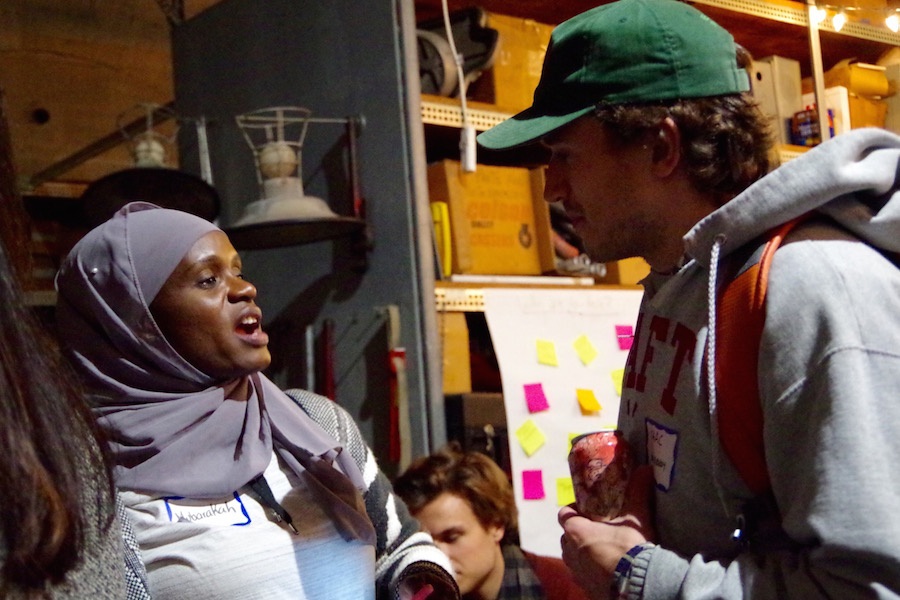
Bradley Street Bike Co-Op | Culture & Community | Economic Development | Food & Drink | Arts & Culture
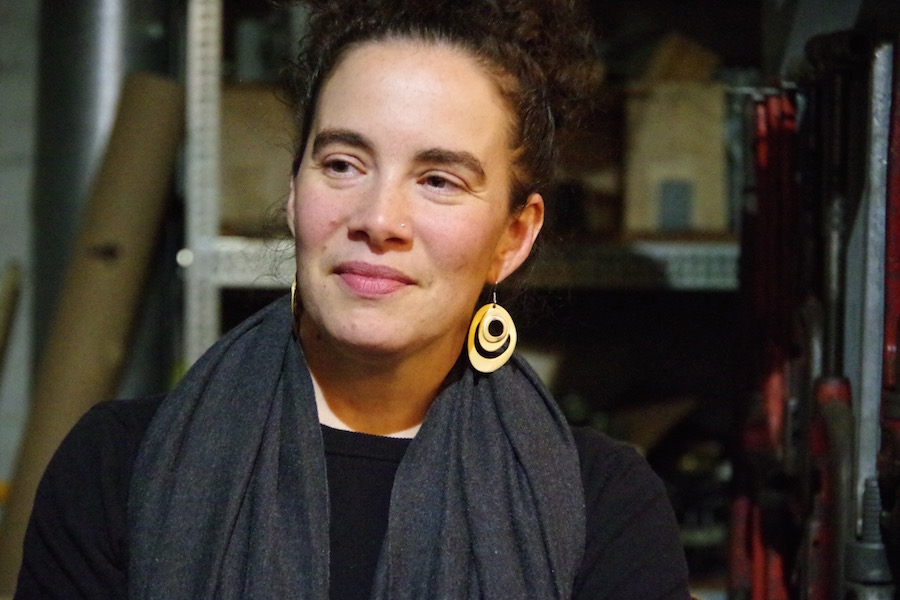

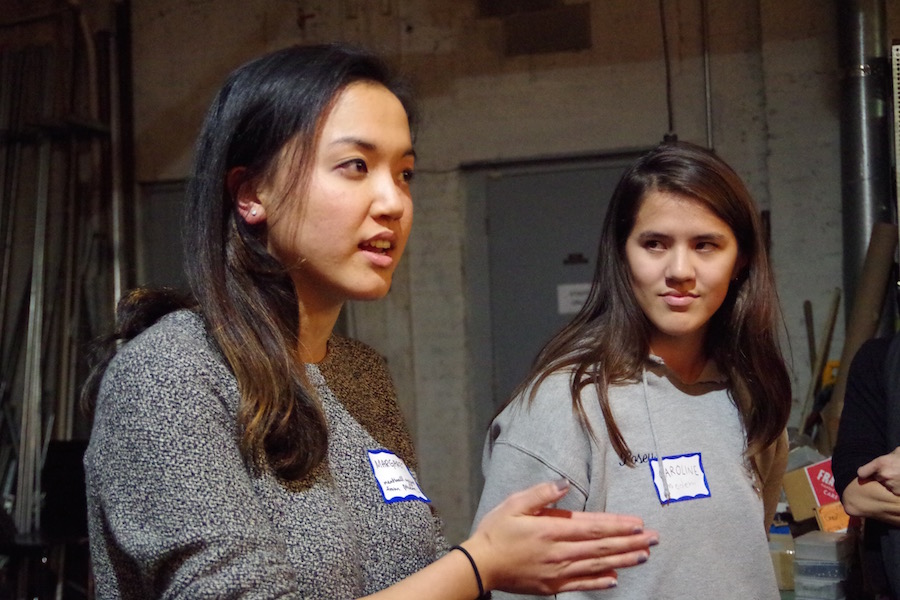
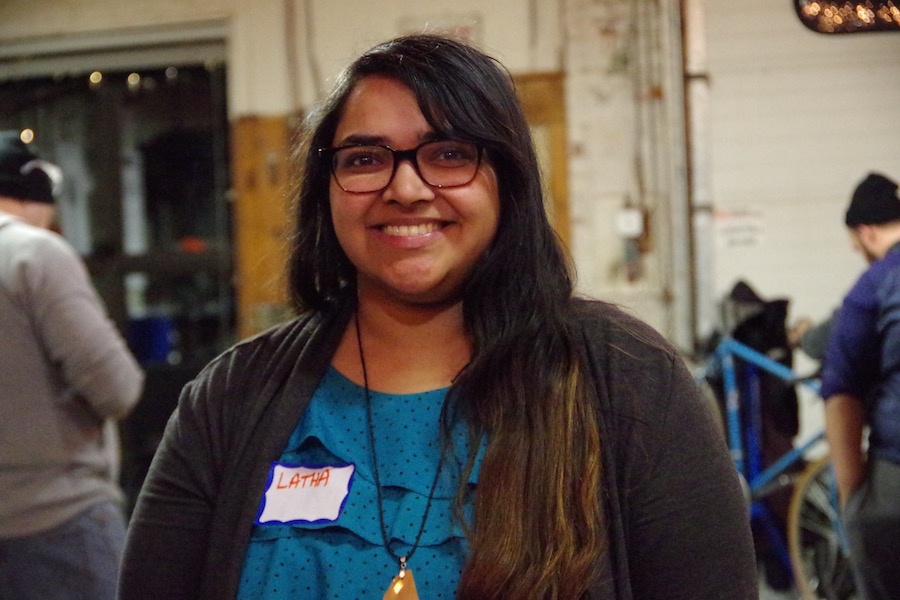

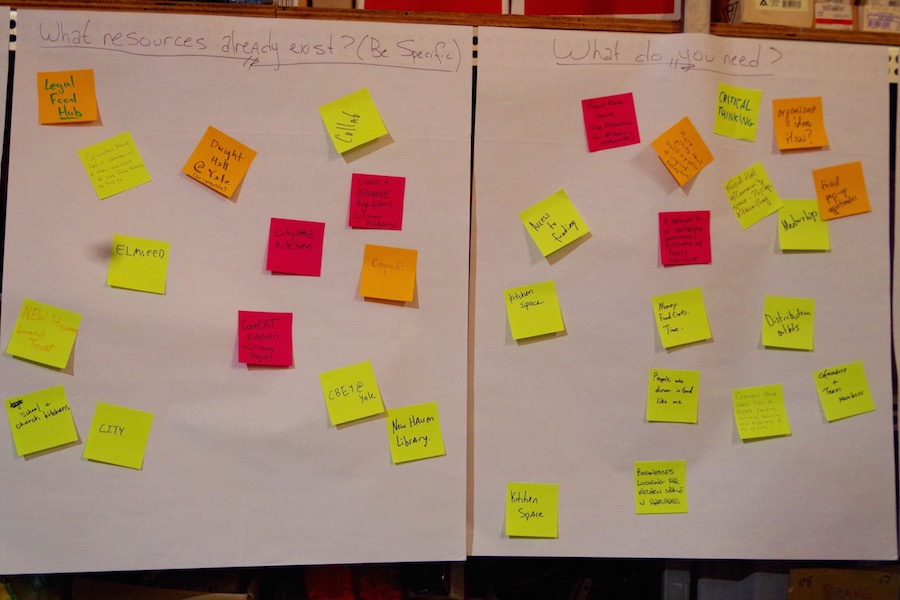
Cricket farming as a path to sustainable protein, and smaller carbon emissions. A power bar that won’t let you crash, because the most potent ingredient is green tea. Pizza trucks delivering community, slice by slice.
Tuesday night, those were just three ideas to hit the first-ever Food Entrepreneurship Meetup, a new business-focused collaboration among Collab, The Table Underground with Tagan Engel, Breakfast Lunch & Dinner, and Dwight Hall at Yale. Held out of the Bradley Street Bicycle Co-Op in East Rock, the event brought out close to 60 participants who plowed through Modern pizza and Black Hog beer while doing a sort of speed dating for food businesses.
The idea is several years in the making. For close to a decade, Food justice advocate, chef, and radio host Tagan Engel had been working with city officials on an incubator kitchen idea that seemed to catch on, get halfway through planning phases, and then fall through. Then last year, she met Devita Davison, head of Food Lab Detroit, at a food conference. She recalled learning about the lab, and realizing "that a lot of these things could work in New Haven."
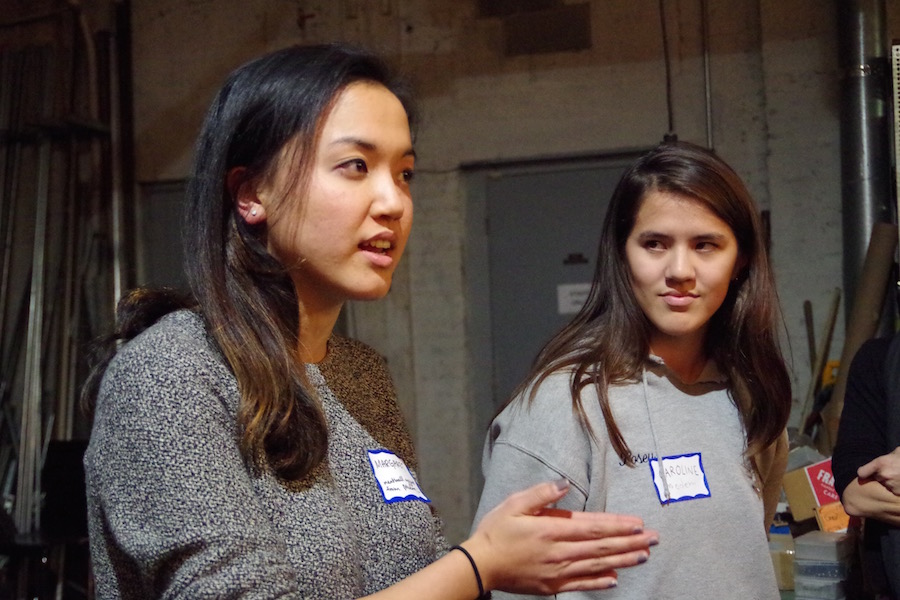
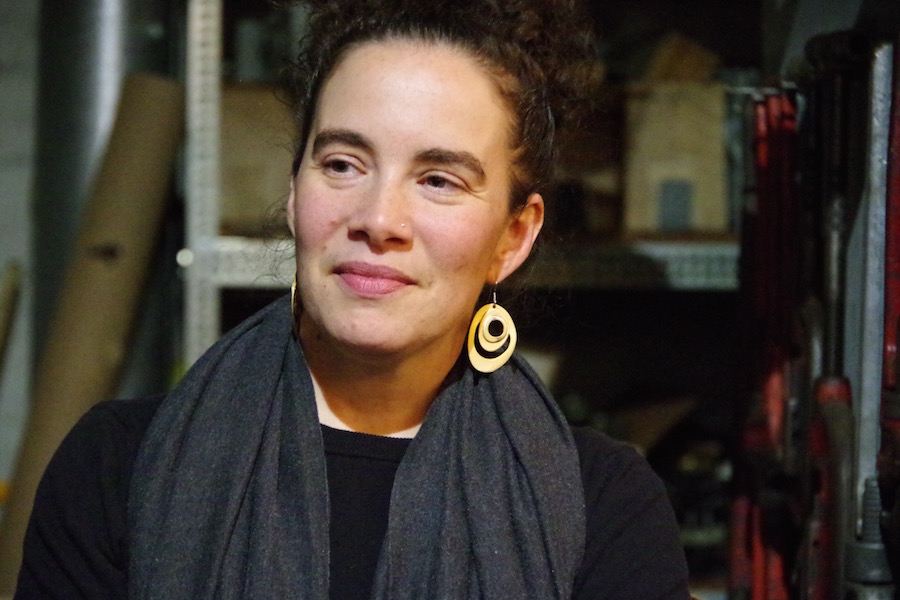
After the conference, she and Davison corresponded for months. Engel wanted to bring her to New Haven; she looped in Yale Sustainable Food Program fellow Austin Bryniarski when he was planning the 2017-18 speaker lineup. They arranged a date in September to have her come to the Yale Farm and speak about her work.
Before Davison arrived, Engel reached out to another collaborator—Breakfast, Lunch & Dinner founder Ony Obiocha, who she thought could help bring food entrepreneurs out to the event.
 Obiocha at the event. Lucy Gellman Photos.
Obiocha at the event. Lucy Gellman Photos.
Their timing was in lock step: Obiocha was also thinking about how to better engage food entrepreneurs. Earlier this fall, he and business partner Jeff Devereux went on their first “Rustbelt roadie,” touring stops in Pittsburgh, Columbus, Cleveland, Chicago and Detroit. An organizer of Hartford’s KNOW GOOD Market and Director of Innovation at Dwight Hall, he’d also listened to what several people in the city had to say about an incubator kitchen or small business hub. And then he realized he was doing it wrong.
That realization, he said, came partly as he listened to Davison about how her work led to new forms of business building. Then in October, he and Devereux went on their trip, winding through “essentially, bigger New Havens” in the Midwest to see how those cities were balancing stretched resources and aspiring business owners.
Obiocha said they realized that change wasn’t happening at an institutional level. Not for small business advocates and aspiring entrepreneurs, at least. It was happening at the grassroots, in small networking groups and monthly gatherings.
Gatherings like the one he and Engel helped convene on Tuesday. Noting that the meetup, in some form, has "been in the works for many years," Engel called it "a good start" to a project that may grow to include a greater diversity of participants.
 Obiocha: Let's try change at the grassroots.
Obiocha: Let's try change at the grassroots.
"What I look to in the future is looping in food entrepreneurs and people who want to support food entrepreneurs for the community ... so that we can gather resources and help them be successful so they're not navigating it on on their own. "
“Everything we need to be successful we already have,” Obiocha said, spending some of the event standing on a chair to address the crowd. “It’s a matter of looking around and saying the people we need to build it aren’t the institutions, the organizations in a community … it’s just the laymen. The people around us who want to see us lead happier, healthier lives.”
“We just want to have people get to know each other,” he added. “There’s so much power in that alone”
Both he and Engel added that Tuesday’s event was meant to double as a springboard for similar gatherings next year. In January, all four collaborators intend to make the meetup into a monthly meeting, where entrepreneurs at any stage of their project are welcome to come and exchange ideas, business tips, and contacts. The theme dovetails with Collab, an business incubator program that launched earlier this fall.
A consistent location for those 2018 meetings has yet to be determined. The first will be held Jan. 16 at The Urban Collective, CT on Willow Street.
Tuesday, the crowd cheered as Obiocha, Engel, Smith and Lee announced that news, and took turns addressing attendees from a half-circle with a chair in the middle. Behind them, grease-stained pizza boxes sat flung open, slices winking out as each spoke.
Occupying half the co-op—the other half was dedicated to cyclists who had stayed to work on their bikes—participants then threw themselves back into a networking frenzy, clustering under the co-op’s low lights and blowing heat lamps as their conversations became a low roar.
One of those participants was Latha Swamy, senior advisor in planetary health at the Yale Center for the Study of Globalization. A graduate of the Yale School of Forestry, Swamy said she wants to look at how dietary changes can impact global patterns of eating, and make the world a more sustainable place.
 Latha Swamy.
Latha Swamy.
“I’m just starting to think about it,” she said. “Does that make sense?”
But fellow food entrepreneurs were interested in hearing about a project she’d completed while at Yale a few years ago, with a team of four fellow grad students. They'd begun to think about cricket farming—that is, breeding crickets for the specific purpose of food—as a more sustainable way of eating protein. Years later, two of her colleagues had cricket-distributing Poda Foods in Portland, Ore.—and she was looking ahead to a new project that would connect global food systems through dietary changes.
Or Isaac Morrier, a Yale undergraduate who bounced from attendee to attendee describing his product, Verb Energy Bars. A small business that started after his roommate’s late-night caffeine and sugar binges led to crashing, the bar comprises green tea, oats and cocoa. Ingredients, said Morrier, that lead to a sustained boost of caffeine and energy instead of a spike and subsequent crash. With four business partners, he's now working on rolling it out on a scale larger than energy-starved undergraduates and audience who've heard through word of mouth.
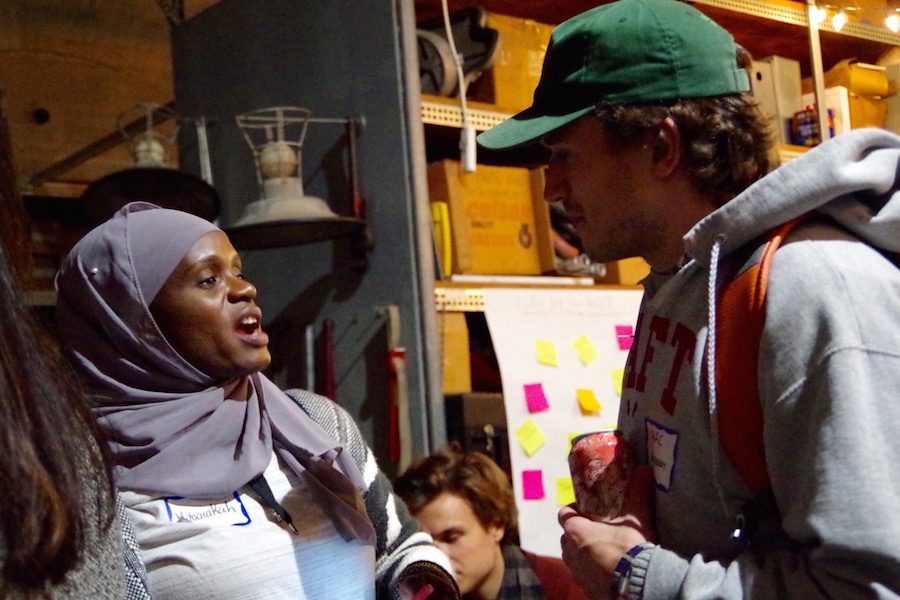 Mubarakah Ibrahim of Mmmm Pies speaks with Morrier.
Mubarakah Ibrahim of Mmmm Pies speaks with Morrier.
Dotting the room, there were also several seasoned professionals ready to step in, and give a few pro tips. Watching the crowd from the edge of a table, Big Green Truck Pizza founder Doug Coffin handed out business advice to anyone who asked, exhorting the power of failure in a short conversation with Lee. But even he found the meetup unexpected: a potential marketing partner introduced themselves to him, and the two ended up chatting about Big Green Truck's future, which includes an expansion and restaurant.
“I would never have met them outside of this event,” he said, asking that their name not be used. “For me that was great.”
His conversation was cut short when he noticed a foodie problem: the crowd, many members of whom had listed their favorite pizza places on their name tags, had run out of pizza at a record speed. A few people had move on to a spice-flecked bean pie that baker, business powerhouse and fitness trainer Mubarakah Ibrahim had brought with her. Others eyed one remaining slice of gluten-free crust, circling the table nervously.
“I’ll be back in 35 minutes,” he told Engel, already working through what needed to be fired up as dough was tossed, disks were formed and toppings thrown on. Then he headed out, walking towards his Humphrey Street pizza-scented digs. 40 minutes later, he walked in with two armfuls of pies, the boxes still warm.
“I was just glad to be able to help,” he said afterwards. “With all of these things, I think the chance for people to network is the best thing. Who knows what will come out of it?”

